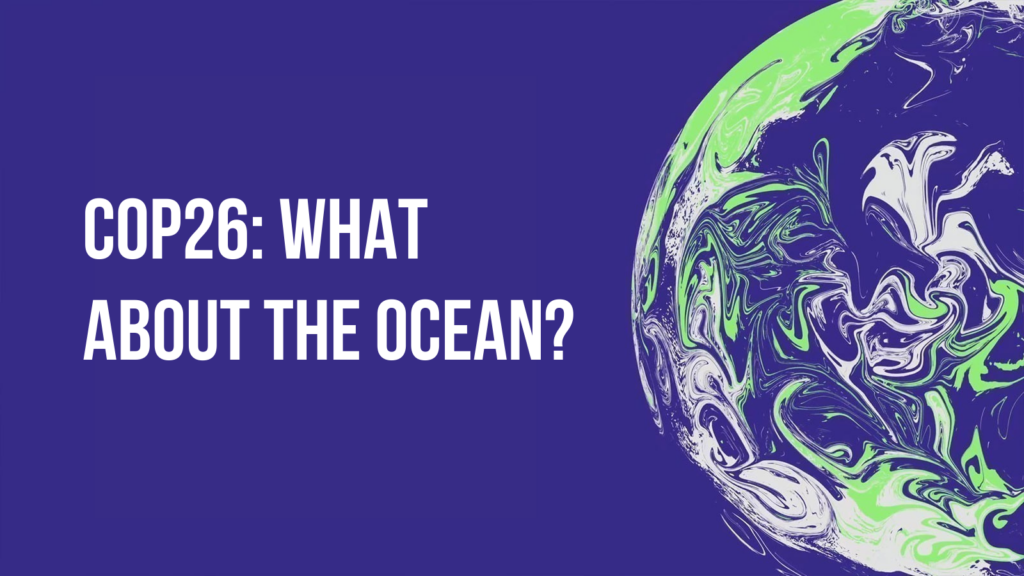The 26th Conference of the Parties took place this year in Glasgow, UK. The Conference set four objectives – mitigation, adaptation, finance, and collaboration. After two weeks of intense negotiations, agreements have been reached. What are the conclusions? What is the outcome for the ocean?
COP26 addressed four main topics
COP26 was of particular importance as the 197 signatory countries committed to strengthening their emission reduction targets between now and 2030 and to reviewing them annually, rather than every five years, which quickly made them obsolete.
Parties agreed to keep to 1.5°C alive. Under the Paris Agreement, 195 countries set a target to keep average global temperature change below 2°C and as close as possible to 1.5°C. Before COP26, the planet tended towards 2.7°C of global warming. Based on new announcements made during the Conference, experts estimate that we are now on a path to between 1.8°C and 2.4°C of warming.
Parties established a work programme to define global goals for adaptation. The outcome of the negotiations on “loss and damage” disappointed the most vulnerable countries, as no commitment to mobilise new funds in the framework of a specific mechanism was agreed – thus postponing this issue to the next COP.
Parties agreed to double finance for adaptation from so-called “developed” countries to “developing” countries. While 100 billion dollars were to be released to the least developed countries each year from 2020, this objective will not be reached before 2023. The Parties are encouraged to at least double their collective contribution to climate change adaptation financing by 2025, compared to 2019 levels.
Parties reached an agreement on the outstanding elements required to fully implement and make fully operational the Paris Agreement. The so-called Paris Agreement Rulebook provides detailed guidance and sets the requirements for countries to reach a zero-carbon future.
The ocean was not a core issue
The ocean community was strongly mobilised for this COP. However, the ocean was not a central topic in the discussions carried out by the Parties, as it was only mentioned as an issue that would deserve a specific treatment.
The preamble of the Glasgow pact underlined “the importance of ensuring the integrity of all ecosystems, including in forests, the ocean and the cryosphere […]“. The Parties also recognised the intrinsic links between the ocean, climate and biodiversity and the need to address them jointly in international climate and biodiversity processes. They are invitedto consider how to integrate and strengthen ocean-based action in their existing mandates and workplans and to report on these activities within the existing reporting processes.
In conclusion, action has been taken to institutionalise the place of the ocean within the climate convention.
And the ocean community reacted
The Ocean & Climate Platform asserted that “despite the ocean being increasingly recognised for its role in mitigating and adapting to climate change, its health remains particularly threatened by human activities. Only a drastic reduction in GHG emissions to limit warming to 1.5°C will safeguard the integrity of the ocean.”
The ocean stakeholders all over the world expected a much larger space for the ocean in COP26. This is reflected, for instance, in John Kerry’s word, U.S. Special Presidential Envoy for Climate: “When the world talks about the climate crisis, the ocean crisis must be front and centre in that conversation. One way to ensure that happens will be to establish an ongoing forum for ocean issues here in Glasgow in the COP26 decision text.”
Ambassador Waldemar Coutts, Director for Environment & Ocean, Foreign Ministry (MoFA), Chilean Government, also expressed his opinion: “the leadership of the Chilean MoFA was key in the process of promoting the ocean as a relevant carbon sink and climate regulator. We were very pleased to have been able to contribute to an ambitious text decision on the ocean at COP26, working together with other Parties and with the crucial participation of civil society. Integrating the ocean into the UNFCCC process is a necessary step. Ocean action is climate action and one of the keys to solving the climate crisis.”
Science-based, reliable ocean data and information are more than ever needed to meet the goals set forth at COP26. As Pierre Bahurel, Director General of Mercator Ocean International asserted, “the ocean is a topic on its own: it holds its own environmental, societal and economic issues to be considered. Taken together, from an ocean perspective, these threefold issues can bring to solutions and contribute to the global challenges the climate and biodiversity are facing today. I’m happy to see that the importance of the ocean is finally recognised in the highest echelonsof the international political arena. The goals accomplished during this COP are important steps in a long path ahead of us. Unfortunately, time is running out: we have a duty to strengthen the voice of the ocean calling for solutions”.

